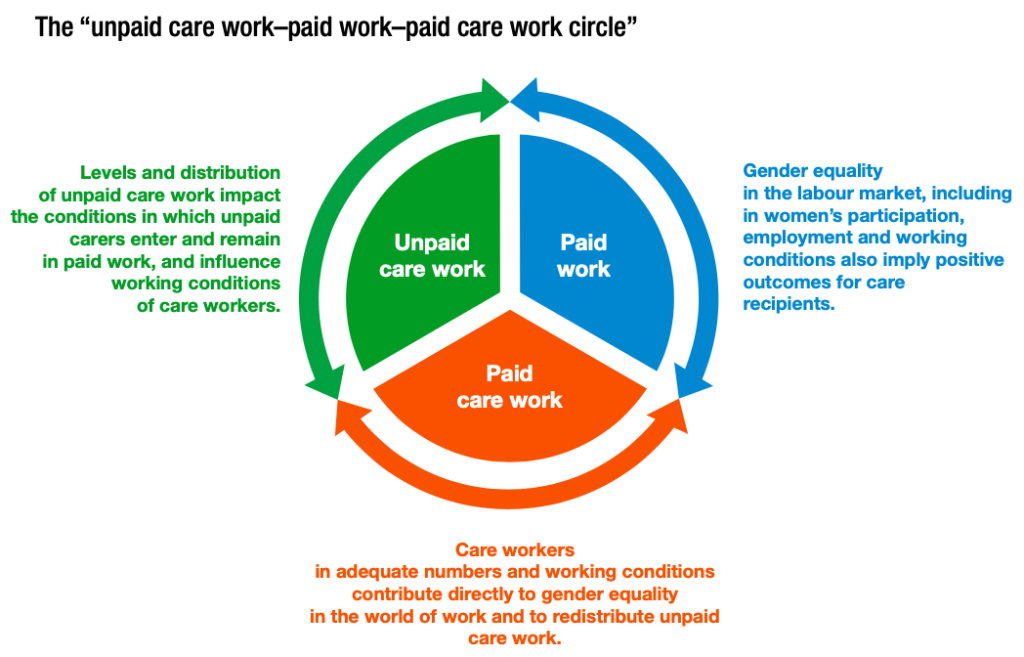Revaluing Care Work: Integrating Care And Consumer Economics
Syllabus:
GS-2:
Salient Features of Indian Society , Role of Women
Focus:
The recent UN International Day of Care highlighted the growing recognition of caregiving’s importance. As societal and economic demands increase, there’s a need to reimagine how care work is valued and integrated into policy, especially as gender and economic inequalities persist.
Understanding the Disconnect Between Care and Consumer Economies:
- The care economy and the consumer economy are often treated as separate, though they are deeply interconnected.
- The rise of consumer spending, especially around festivals like Diwali, often overshadows the essential work of caregiving.
- Care in its many forms—emotional, physical, psychological—is integral to human well-being and should be recognized in economic frameworks.
- Yet, care is frequently overlooked in favour of more visible consumer-driven growth, reflecting a cultural shift toward individualism and competition.
What is Care Work?
- Definition: Care work involves meeting the physical, mental, and emotional needs of individuals, ranging from infants to the elderly, including both paid and unpaid roles.
- Scope: It includes tasks like nursing, child-rearing, personal care, and indirect services like meal preparation and cleaning.
- Economic Role: Care work is vital for the survival of social systems and economies, sustaining families and communities.
- Pandemic Highlight: The COVID-19 pandemic underscored the critical importance of care work for societal functioning.
- Job Creation: Doubling investment in care work could create 117 million jobs by 2030, with low risk of automation.
- Gender Impact: Countries investing in childcare infrastructure and parental leave policies see higher maternal employment rates, reducing the burden on women.
Recognizing the Value of Care Work:
- The demand for care work is vast—ranging from child-rearing to elderly care—with a significant portion of the workforce, especially women, bearing this responsibility.
- Women perform around 6 hours of unpaid care work daily, while men contribute only 30 minutes, highlighting the gender disparity in caregiving roles.
- The economic contribution of care work is significant, ranging from 15-17% of India’s GDP, yet it remains undervalued and undercompensated.
- Policies need to be reformed to recognize care as an essential component of the economy, rewarding caregivers with fair wages and social security.
Challenges in Providing Adequate Care for All:
- Traditional family structures, often romanticised in Indian culture, may no longer be sufficient to provide care, especially as the population ages.
- The increasing demand for elderly care requires new solutions, such as social pensions, improved childcare infrastructure, and incentives for businesses to provide care services.
- While public institutions play a critical role in supporting care, the gap between need and provision remains large, especially in marginalised communities.
The Need for a Cultural Shift in How We Value Care:
- Care is not a commodity but an interpersonal relationship that defies traditional economic models based on buying and selling.
- Public policies that focus solely on penalties or external incentives fail to address the intrinsic human need to care.
- A shift is needed in the way men, in particular, are socialised regarding caregiving roles. Many men are taught to compete and maximise self-interest, neglecting the value of emotional and caregiving skills.
- Educating individuals on the importance of caregiving through both formal education and lived experience can foster a more caring society.
Towards a Care-Centred Economy:
- The work of care, though often invisible, is vital to the well-being of individuals and societies.
- A care-centred economy would recognize the emotional, physical, and psychological nourishment that individuals provide each other.
- To support this shift, policies must reward caregiving roles and integrate them into economic planning.
- True societal progress depends on a recognition of the “unhistoric” acts of care that sustain families, communities, and the workforce. Recognizing these contributions can lead to a more inclusive, compassionate economy.
Key Issues Related to the Care Economy in India:
- Limited Policy Coverage:
- Existing policies like the Maternity Benefit Act, 1961 apply only to establishments with 10+ employees.
- 98% of Indian enterprises are micro-enterprises with less than 10 employees, leaving women in informal sectors without support.
- Limited Workforce Participation:
- The unequal burden of care work hinders women’s workforce participation and career advancement.
- The Female Labour Force Participation Rate was 37% in 2023, indicating limited involvement in formal sectors and decision-making roles.
- Lack of Accessibility to Care Services:
- Affordable and quality care services, such as childcare and eldercare, are limited, especially in low-income areas.
- Women’s unpaid care work accounts for 15%-17% of India’s GDP.
- Social Stigma and Cultural Norms:
- Societal expectations reinforce caregiving as primarily a woman’s responsibility, hindering male involvement in caregiving duties.
Way Forward:
- The 3R Framework:
- Recognize: Acknowledge the childcare responsibilities borne by mothers.
- Reduce: Reduce the load on mothers by involving fathers and offering affordable neighbourhood childcare options.
- Redistribute: Treat childcare as a social responsibility, not an individual burden on mothers.
- Skill Recognition and Micro-Credentials:
- Create a national framework to recognize skills gained through unpaid care work, offering micro-credentials to enhance employability for caregivers.
- Increasing Investment in the Care Economy:
- Increase public investment in care services, potentially generating millions of jobs and boosting women’s workforce participation.
- Technology and Innovation:
- Utilise online platforms to connect caregivers with resources and support services.
- Public-Private Partnerships:
- Foster collaborations between government, private sector, and NGOs to improve the accessibility and affordability of care services, with incentives like tax breaks or CSR initiatives for companies.
Conclusion:
To build a more equitable and sustainable economy, integrating care work into public policy is essential. Providing fair compensation, redefining gender roles, and investing in infrastructure can shift care from being undervalued to being recognized as foundational to societal well-being.
Source: Indian Express
Mains Practice Question:
How can India reform its economic policies to adequately value care work, ensuring both social and economic development? Discuss the challenges and potential solutions.





